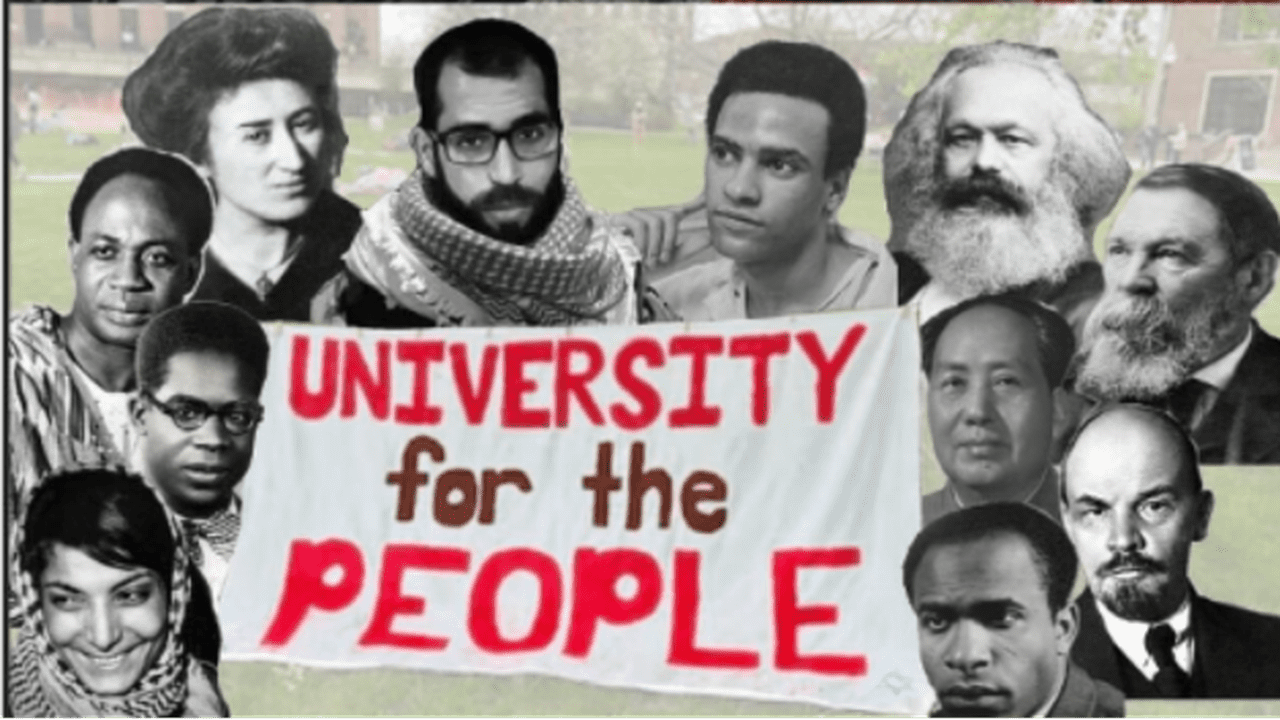
Source: Western Massachusetts Popular University for Palestine Instagram.

While the anti-Israel encampments have largely been dismantled, their architects appear determined to capitalize on what they see as their most successful organizing tactic in a decade. “Summer school” is now in session, led locally and nationally by pro-Palestinian individuals and groups.
These ”schools” — currently scheduled to run from June through August — are designed to educate and train student and community activists. Some are only open to current students. As of June 25, National Students for Justice in Palestine, SUNY BDS, UMass Amherst + Smith SJPs and San Francisco State University associate professor Rabab Abdulhadi have each provided links to register for their own programs.
Curricula vary from school to school, but the teaching generally focuses on Palestinian history, political action and practical skills training.
Support for the Boycott, Divestment, and Sanctions movement is ubiquitous among the groups organizing these sessions, which are led by seasoned anti-Israel activists, but is often seen as “the floor, not the ceiling.” Students may learn “lessons” from encampments and other “direct actions” alongside political theory and basic organizing skills. Participants will also likely emerge with stronger social networks, which have been critical to successful encampments.
Participants must commit significant time and energy to these programs, as evidenced by the calendar information below.
2024 Schools
UMass Amherst and Smith SJP’s “Political Education Summer Camp” (June 1- Aug. 31) is an encampment spin-off, focused on community building, political theory and Palestinian history. Open to all.
National SJP’s “summer school” (tentatively July 1- Aug. 9) consists of 15 two-hour online sessions, with course themes such as “Our History & Path to Freedom,” “Raising Consciousness, Building Revolutionaries” and “How We Win.” Applications opened June 20 and are limited to undergrad and grad students who are SJP leaders, SJP members those leaders vouch for or leaders of partners organizations like MSA and JVP.
SUNY BDS’s virtual “Summer Academy” (July 1 - 28) is focused on organizing, digital security and media/PRi Registration and courses were released on June 20. Open to all.
Rahab Abduhadi’s summer school class at SFSU (June 6-July 5) will use the Teaching Palestine: Pedagogical Praxis and the Indivisibility of Justice platform, focusing on “Palestinian diasporic experiences” and the “Palestinian resistance movement.” Teaching Palestine is another project of Abdulhadi’s. She describes it as “an intellectual project that focuses on watershed historical moments that shape & influence the Palestinian struggle for justice, freedom and return.” The summer 2024 class is an encampment spin-off. Abdulhadi claims SFSU abruptly cancelled this as a summer course, so she is offering this class without being compensated for it. It is open to all, though students may earn independent study credits.
Summer camps in previous years
This isn’t the first time these types of programs have sparked concern. In 2013, the mainstream Jewish community voiced concerns about new anti-Israel “summer camps” established to teach anti-Israel historical narratives and sow hatred for the Jewish state. Led by American Muslims for Palestine (AMP), American Friends Service Committe (AFSC) and Jewish Voice for Peace (JVP), these programs taught college students how to organize BDS campaigns and weaponize the Israel-Palestine conflict against Jewish and Zionist students.
Jewish summer camps have not been immune to controversies around the conflict either. In 2018, IfNotNow clashed with Conservative movement youth group Camp Ramah, over how to teach the conflict.
In a March 2018 meeting, INN demanded the camp do more to “educate” about what they see as Israel’s occupation. Initially, Ramah director Mitch Cohen intimated Ramah was open to the idea of discussing the creation a broader Israel curriculum with Ramah directors and senior educators, “with the goal of providing our teens and staff members at our camps and Israel programs with a full range of opinions on the conflict.”
In the interim between that meeting, and the official start of Ramah summer sessions, INN held a training for counselors in May 2018, leading to accusations it was attempting to ‘infiltrate” the camp with its programming.
The training materials from the May 2018 session include suggestions for activities and tactics ranging from saying Kaddish for everyone, presumably including both Israelis and Palestinians, every morning after people died in/around Gaza, to bringing up occupation in casual conversation, and potentially holding a “Peulat Shabbat on Occupation.” Additionally, the Liberation Syllabus includes a reading recommendation: “Men in the Sun”, written by former Popular Front for the Liberation of Palestine spokesperson and late author Ghassan Kanafani.
Finally, in June 2018 Ramah announced it would not agree to any of INN’s suggestions, with Cohen noting, “we made it very clear to them that while liberal pro-Israel views on the conflict can be voiced and taught at camp, we do not allow any anti-Israel, anti-Semitic or anti-Zionist education at Ramah.”
The fight over Jewish summer camps became such a flashpoint, in part due to the nostalgia many carry from their days there, as well as the prominence Ramah camps have within the Jewish community. Summer camp is also considered one of the core ways the Jewish identity as well as affinity for Israel is formed and solidified. Therefore, the content of educational materials will always be subject to intense scrutiny.